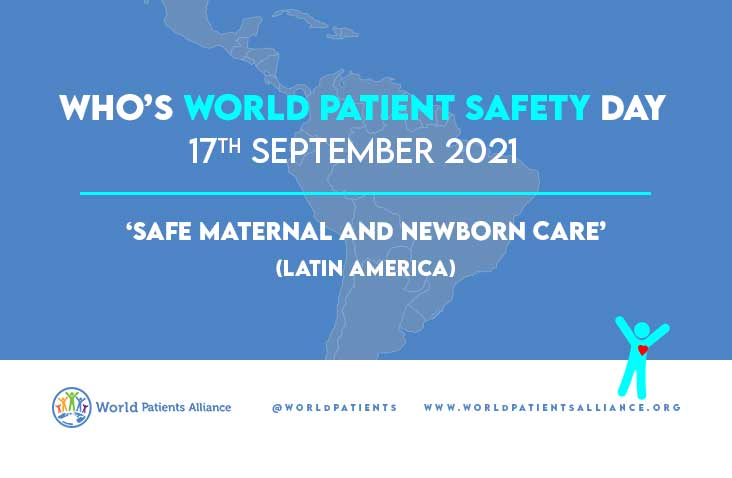
WPA WPSD LATAM webinar 2021
World Patients Alliance
World Patient Safety Day
Latin American webinar
The Spanish-language World Patient Safety Day webinar for Latin America was held on September 9 at 12:00 noon CDMX time, Mexico. The webinar was organized by WPA Patient Safety Committee member Helen Haskell and hosted and moderated by WPA board member Karla Ruiz de Castilla and the Peruvian NGO Esperantra. Technical support was ably provided by Haris Khalid of WPA and Alessandra Tarrillo of Esperantra. Over 100 people from throughout Latin America registered for the webinar.
Speakers covered a wide range of topics in patient safety. The webinar was opened by Karla Ruiz de Castillaand Helen Haskell, who introduced the World Patient Alliance and the theme and concepts of 2021 World Patient Safety Day. The first speaker, patient advocate Evangelina Vazquez Curiel of Mexico spoke movingly about the 2021 theme of World Patient Safety Day, Maternal and Child Safety. Her talk addressed the issue of obstetric violence in its various forms and its negative impact on patient safety. This is a serious problem throughout the Americas. She also discussed maternal mortality and its relationship to infant mortality and morbidity. Maternal deaths have been high due to Covid19. Initiatives and guidelines that were generated to prevent these problems in Mexico were presented, and the participation of patients was proposed to help prevent these adverse events.
Next, Attorney Randall Madrigal Madrigal, a Patients for Patient Safety advocate, spoke about the right to safe health care. He referred to the importance of incorporating provisions on patient safety and the reporting of adverse events into the legislation on patients’ rights in different countries. On this point, he mentioned the importance of abandoning the punitive approach that discourages reporting or notification, based on the fact that the important thing is to bring errors to light so that they do not occur again; all this is in protection of the fundamental right to the protection of health and life.
Dr. Edita Falco de Torres of Uruguay, a surgeon and improvement expert, addressed human factors and quality improvement in medicine. WHO reports that 134 million incidents happen in hospitals each year and that 4 out of 10 patients who are treated in consultation or in hospitals receive damage. Other global statistics place medical error as the third cause of death. Why has the situation not improved, 20 years after the seminal report To Err is Human created a growing concern for patient safety.? All the measures that were implemented were not as successful as expected. If the situation has not improved after 20 years, Dr. Falco de Torres argued, it is time to change the treatment. Ergonomics or the science of human factors proposes a different, global look at the problem. We have archaic structures that are maintained by habit: hospitals staffed with tired and inexperienced residents, infrastructures that conspire against an agile service, and many other things. As James Reason and Lucian Leape have pointed out, the medical environment is an ergonomic nightmare. It is upon us to push for the dramatic change that the health system needs.
Professor of Pharmacy Angela Caro Rojas from Colombia, a noted leader in pharmacovigilance, spoke about patient leadership and medication safety. She argued that patients need to act as leaders in their health-disease process. They need to understand that the most important responsibility lies not in the healthcare system, but within themselves. This starts with cultivating healthy habits but, in addition, people should make a point of understanding their disease and everything related to it, including their medication and the best way to use it.
For patients to take leadership requires them to have confidence in themselves, to have a vision or a goal, and to receive knowledge from healthcare workers. But above all they must take responsibility in an intentional way. Making decisions is the most important work of a leader, and the best decisions are only possible if patients understand all the options and the possible results. For that, Professor Caro Rojas concluded, patients need to have the right information and assume responsibility for their own decisions.
The 2021 Latin American World Patient Safety Day webinar is available for viewing on the Esperantra-WPA YouTube channel at World Patients Alliance Seminario Web Regional América Latina (WPSD 2021) – YouTube.
-Helen Haskell

